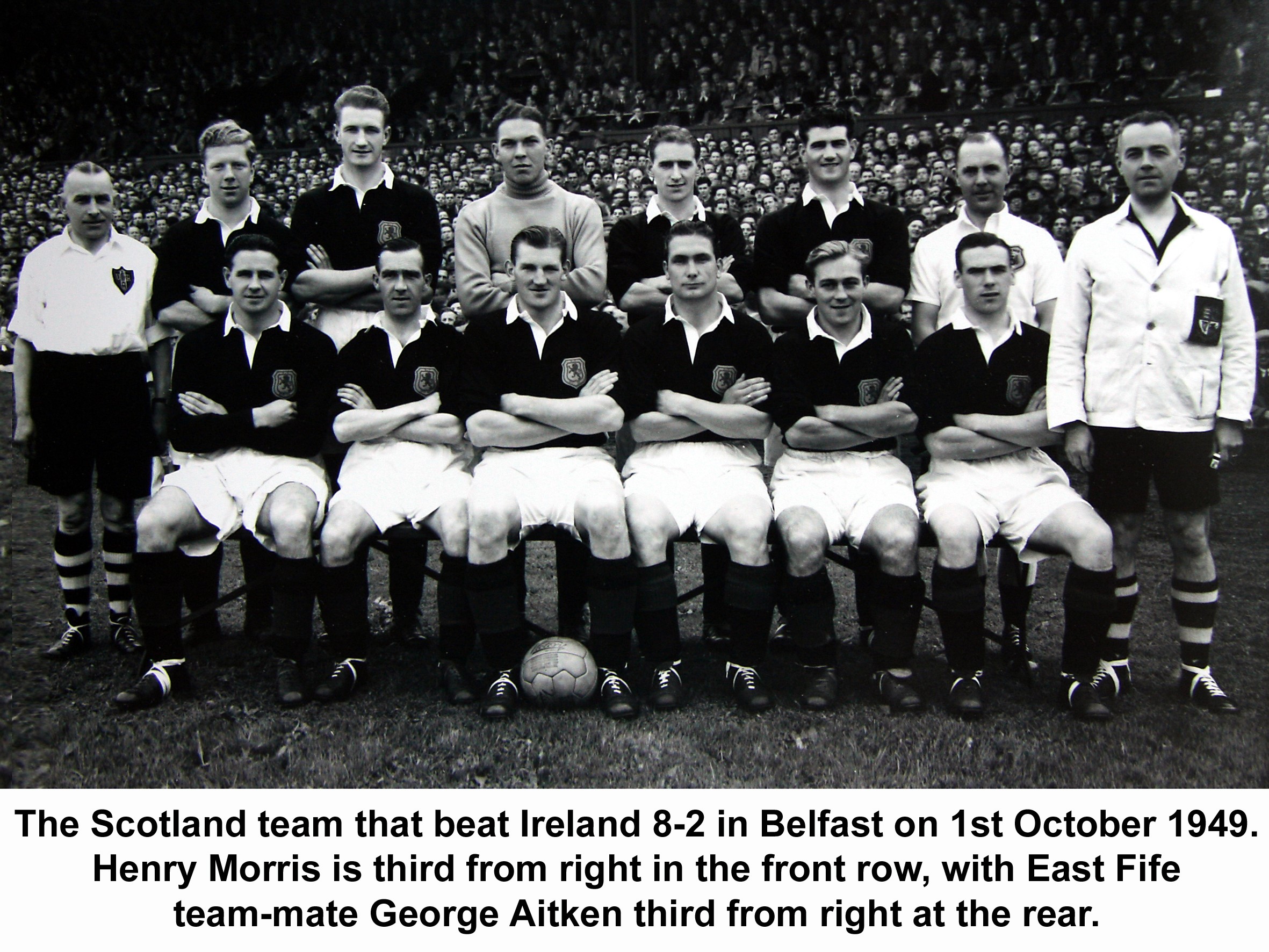What was the name of the footballer who scored a hat-trick on his international debut but was never selected to play for his country again? This question has undoubtedly cropped up in pub quizzes all over the country, and the answer, if you didn’t already know, is East Fife’s Henry Morris!
Henry was born in Dundee on 17th December 1919, and was relatively late in stepping up to the Senior game at the age of twenty-six; his football development having been delayed by active service during World War Two.
Before the war, Henry had turned out for Lochee Central, where he formed a striking partnership with inside-forwards Jake and Dougie Davidson, a trio which was destined to fill the same role at Bayview during East Fife’s Halcyon days. Indeed, all three were transferred from Lochee to Dundee Violet during the summer of 1939, where the lethal striking force scored an incredible 36 goals in just four games, with Morris netting four times and the Davidson brothers a goal apiece in a league match against East Craigie at Glenesk Park on 11th August. Such was the attraction of the high-scoring Violet team at this time, an incredible crowd of 6,270 paid to see the ‘Pansies’ take on Dundee Harp at Glenesk Park that same month!
After being de-mobbed at the end of the Second World War, all three players teamed up once again at Dundee Violet, but it wasn’t long before the senior talent scouts came calling. On Friday 7th June 1946, East Fife fought off a host of Scottish and English clubs, including Dundee United and Blackpool, to land the signature of Henry Morris, who was joined a week later by Violet team-mate Dougie Davidson. Doug’s brother Jake, however, opted instead to sign for Dundee United, thus breaking up the striking partnership.
In Henry’s first season at Bayview, 1946/47, the centre-forward scored an amazing 36 goals in 37 competitive appearances; but things were to get even better the following season following the signing of old partner Jake Davidson, who had failed to hold down a regular place in the Dundee United first team during his year at Tannadice. The old trio were now back together again, and season 1947/48 saw Henry Morris score 59 goals in 48 appearances with the Davidson brothers weighing in with 32 goals between them; all three ending the campaign with a League Cup winners’ medal and a ‘B’ Division Championship medal to show for their efforts!
Although playing against tougher opposition in the top flight during season 1948/49, and without the assistance of Doug Davidson for most of the campaign following the player’s transfer to Blackpool in October 1948, Henry Morris still managed to find the net no fewer than 25 times in 37 appearances. It was inevitable that Henry’s scoring exploits would come to the attention of the international selectors, and the player was finally called up for international duty for the Home International Championship match against Ireland at Windsor Park in Belfast on 1st October 1949, which was also to double as a qualifying match for the 1950 World Cup in Brazil.
On the Tuesday preceding the match, Henry and East Fife team-mate George Aitken met up with the rest of the Scotland party at Broomielaw Quay in the centre of Glasgow, where they battled their way through hordes of young autograph hunters and newspaper reporters before boarding the steamer Royal Ulsterman, bound for Belfast. Asked on the quayside how he felt about getting called up to the national team, Henry modestly replied: “I’ll do my best not to let Scotland down”.
Henry certainly didn’t let the team down, as after just two minutes’ play he got his head on to a cross from Willie Waddell to put the Scots ahead. It was a dream start to his Scotland debut and, into the bargain, Henry had written himself into the history books as the first British player to score a World Cup qualifying goal! And it wasn’t to end there, with Henry Morris scoring another two second half goals to complete a debut hat-trick which, along with two goals from Rangers’ Willie Waddell and further strikes from Derby’s Billy Steel, Hibs’ Lawrie Reilly and Third Lanark’s Jimmy Mason, was more than enough to sweep the Irish aside and record a remarkable 8-2 victory.
Having made such an impressive Scotland debut, one would naturally assume that Henry Morris would once again line up alongside East Fife team-mate George Aitken in Scotland’s next international at Hampden on 9th November 1949. Morris was not in the team that beat Wales 2-0, however, and it was assumed by many that the player had been snubbed by the international selection committee, but this is not quite true. The facts of the matter are that Henry picked up an injury in a league match against Motherwell just days before the Wales match, which effectively ruled him out. By the time he had regained his form, the Scotland centre-forward position had been claimed by Hearts’ Willie Bauld, which effectively spelled the end of Henry’s international career.
Despite a fall-out with East Fife just weeks after playing for his country, during which speculation was rife that he had played his last match for the club, Henry remained at Bayview until April 1953, during which time he picked up a second League Cup winner’s medal in 1949 and made an appearance in the 1950 Scottish Cup Final. He ended his senior career following brief spells at Dundee United and Portadown in Northern Ireland.
Henry passed away in Kirkcaldy in March 1993, aged 73.
Jim Corstorphine
